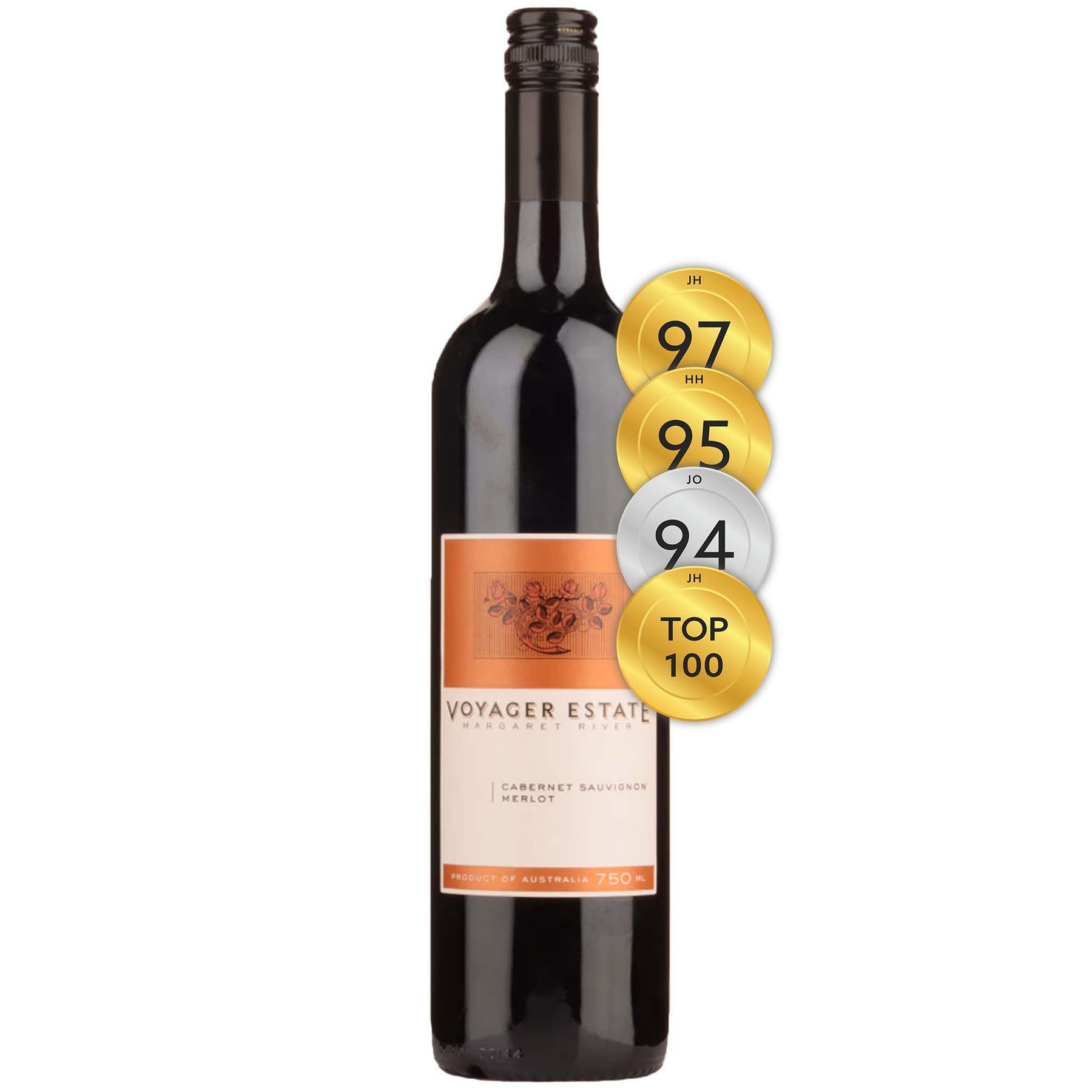
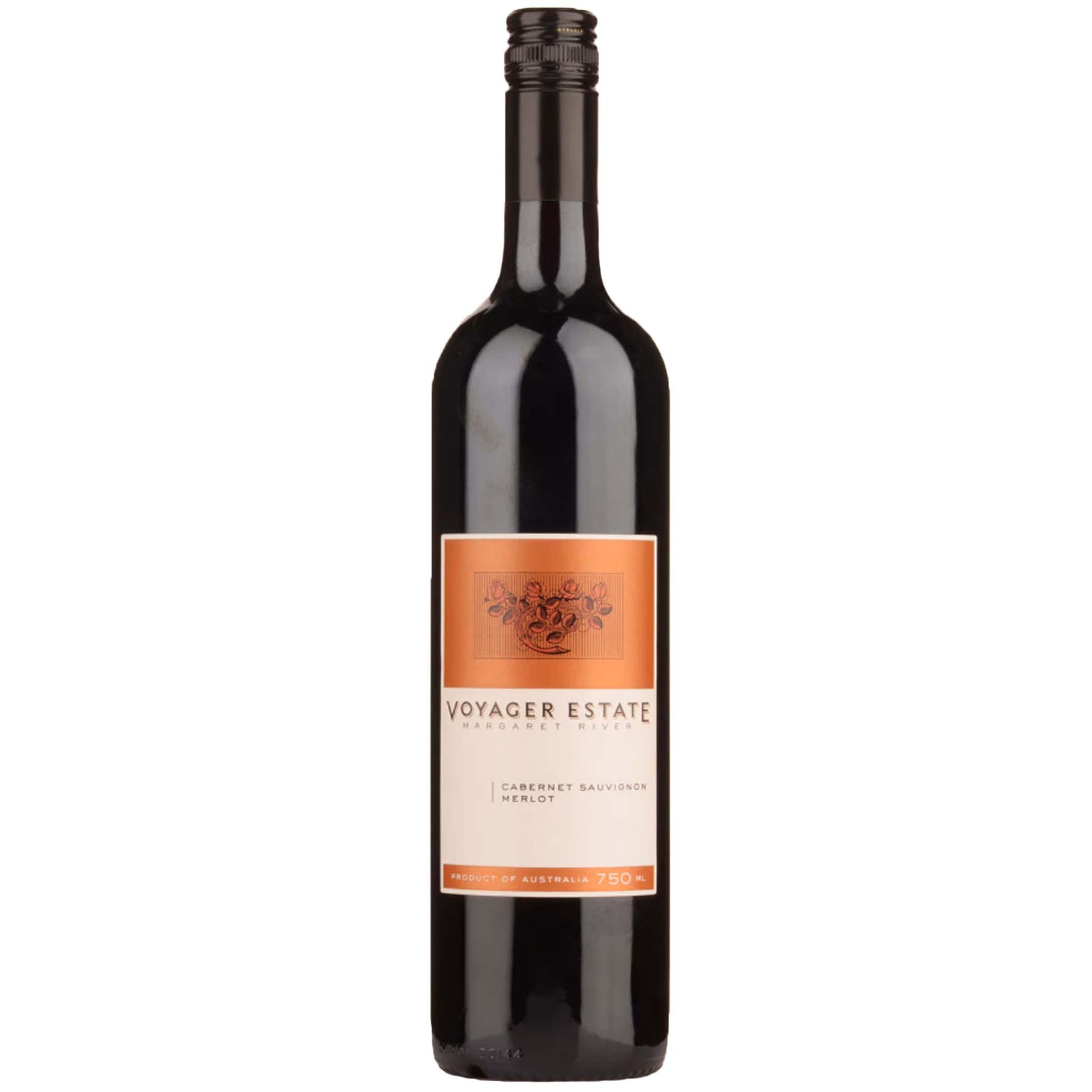
Voyager Estate Cabernet Sauvignon Merlot 2009
Style: Red Wine
Closure: Screwcap
Voyager Estate Cabernet Sauvignon Merlot 2009
Warehouse
34 Redland Drive
Vermont VIC 3133
Australia
Critic Score: 97
Alcohol: 14.0%
Size: 750 ml
Drink by: 2035
James Halliday Top 100 Wines of 2013
Voyager Estate is one of Margaret River's oldest vineyards, located In the Stevens Valley in the subregion of Wallcliffe. The vineyard was first planted in 1978 and subsequently purchased by mining heir Michael Wright in 1991. It is part of what James Halliday refers to as the 'golden triangle' of Margaret River - encompassing Voyager Estate, Leeuwin Estate and Cape Mentelle. This impeccably run Estate crafts a set of wines that ooze style and class
"The attention to detail in this wine is obvious from the beginning, and while the level of new oak is a feature on the bouquet, the depth, complexity and layers of dark fruits, cedar, black olive and graphite minerality is astounding; the mouthfeel further enhances the picture, with a seamless transition across the palate, powerful on entry and then tightening up for maximum restraint and fine-grained tannin persistence on the finish." James Halliday
Expert reviews
"The attention to detail in this wine is obvious from the beginning, and while the level of new oak is a feature on the bouquet, the depth, complexity and layers of dark fruits, cedar, black olive and graphite minerality is astounding; the mouthfeel further enhances the picture, with a seamless transition across the palate, powerful on entry and then tightening up for maximum restraint and fine-grained tannin persistence on the finish. Drink by: 2039.” James Halliday, Halliday Wine Companion - 97 points and Top 100 Wines of 2013
"Deepish red colour with a purple tint. Crisp, crushed mulberry and dusty cedary aromas. This is more black fruits and richly ripe flavour than the other Voyager wine. Full-bodied, weighty, and deep, with amplitude, length and generosity. This is a more typical Margaret River style: perhaps it has more Wilyabrup in it? That's how it tastes. A gorgeous wine!" Huon Hooke, The Real Review – 95 points
"Tightly knit with aromatic, fine-grained new oak, its perfume of dark plums, cassis and mulberries has a faintly herrball, capsicum-like note. Smooth and sumptuous, long and seemless, its deeply layered palate of fresh black, red and blue berry flavours and polished oak meshes tightly with fine, firmish tannins, finishing with length, freshness and focus." Jeremy Oliver - 94 points
Awards
James Halliday Top 100 Wines of 2013
About the winery
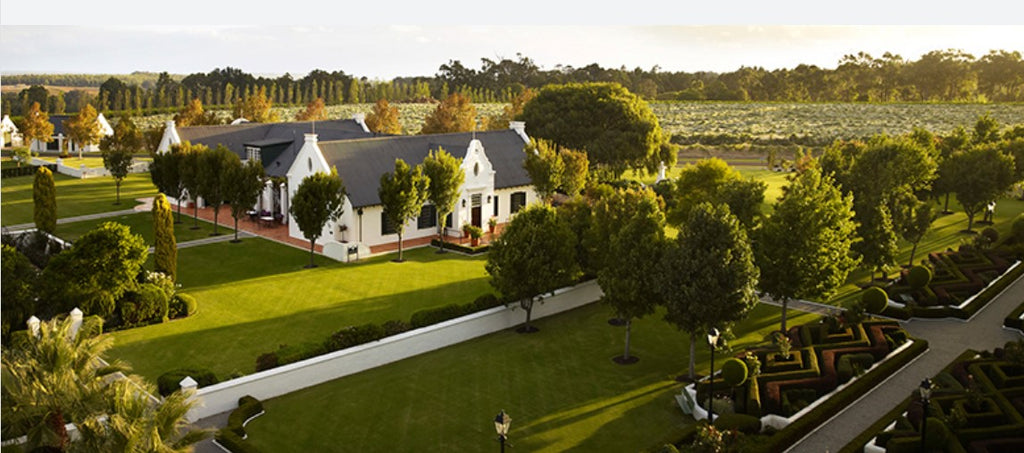 Voyager Estate is one of Margaret River's oldest vineyards, located In the Stevens Valley in the subregion of Wallcliffe. It is part of what James Halliday refers to as the 'golden triangle' of Margaret River - encompassing Voyager Estate, Leeuwin Estate and Cape Mentelle.
Voyager Estate is one of Margaret River's oldest vineyards, located In the Stevens Valley in the subregion of Wallcliffe. It is part of what James Halliday refers to as the 'golden triangle' of Margaret River - encompassing Voyager Estate, Leeuwin Estate and Cape Mentelle.
The vineyard was first planted in 1978 and at the time was known as Freycinet Estate. It was purchased by mining heir Michael Wright in 1991 and renamed Voyager Estate. Michael's agricultural background and extensive knowledge of soils and climate led him to Freycinet, where the uniform gravelly soils with a stony clay base enable moisture and nutrients to be slowly released to the vines.
Michael gradually acquired adjoining properties of similar soil types over time and today the vineyard occupies over 100 hectares. The regional stars chardonnay and cabernet sauvignon take the lead, though there are another 12 varieties planted - shiraz, merlot, petit verdot, cabernet franc, malbec, tempranillo, grenache, semillon, sauvignon blanc, sauvignon gris, chenin blanc and viognier.
The highest priority at the Estate has been the transition to certified organic management. That process initially began with a block of the original cabernet sauvignon plantings which has been organically farmed since 2004. As of 2021, the winery and 90 hectares of the vineyard have been certified organic and the transition is expected to be complete by 2023.
The management process doesn't stop at organics, either, with broader issues very much on the agenda. "Climate Change is an issue of paramount importance, not only for the survival of our species, but also in the way it specifically impacts our industry. We are ultimately working towards becoming a carbon negative business. We're currently building and recording baseline soil carbon levels in the pursuit of this goal.”, says Steve James who was Head of Winemaking and Viticulture for 23 years and is now employed in a consulting role.
Michael Wright, Voyager's founder and visionary, sadly passed away in 2012, but he left a powerful legacy of an absolute commitment to quality that today pervades every corner of Voyager. The Estate remains family owned, with Michael's daughter, Alex Burt (nee Wright), matching her father's fanatical attention to detail with an environmental conscience that has opened another important chapter in the history of this Estate.
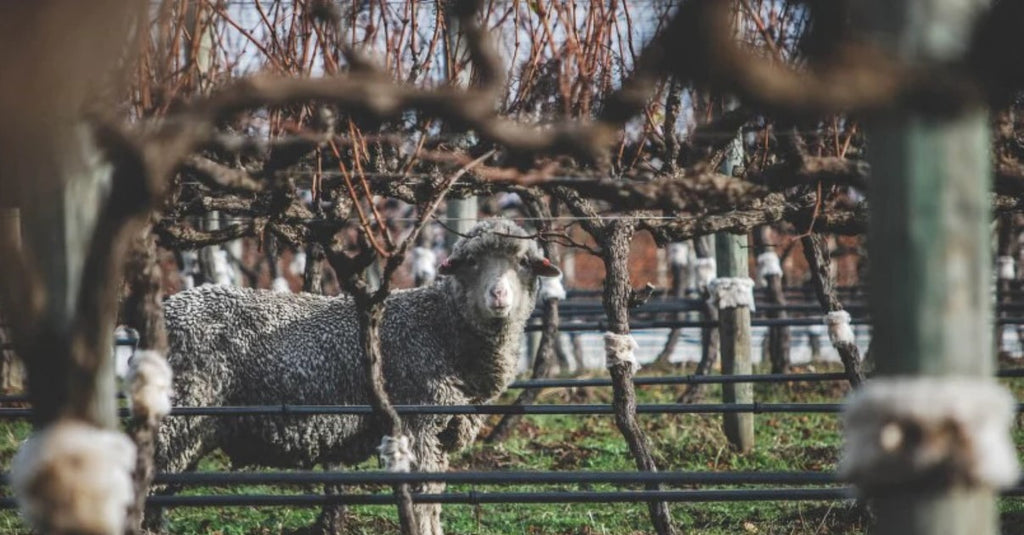
Sheep grazing through the vineyard in winter
The following extract is from an article by Paige Taylor in The Weekend Australian
As the golden end of a warm day settles over Voyager Estate, the hills of rolling vines are literally abuzz. Driving slowly past glistening rows of chenin blanc vines, busting with bright new spring buds, the sound of life is unmistakeable. Insects, hawks, eagles, ibis and native ducks fill the air with movement and sound; there's a sense that life is everywhere. "These vines are singing," says Voyager Estate vineyard manager Glen Ryan, looking out over the property, which shares its footprint with native karri, blackbutt and marri trees.
Voyager Estate wasn't always so lively. For decades, the Margaret River vineyard was like so many of its neighbours: a neat, quiet monoculture. Sprayed regularly to ward off pests and weeds, incidental life - chirping insects and squawking birds, in particular found it hard to flourish here.
Then Ryan and his team set about making a profound change.
With the blessing of proprietor Alexandra Burt, Ryan started taking Voyager wholly organic, removing chemicals from the farm and instituting a natural regimen for the soil and the vines. The result has been one of the most dramatic transformations of a large-scale winery in Australia, with Voyager due to be certified organic in January after more than a decade of incremental change. The 110ha property, 280km south of Perth, has been producing its signature wines without pesticides for years, but the bureaucracy of the certification process moves at a slower pace.
As a business proposal, going organic was not an obvious move for a winery that was already commercially successful and producing great wine. Yields are now 30 per cent lower than they were in pre-organic days. The cost of producing the grapes is higher, too. But "it's such a beautiful way to farm", says Ryan, who adds that the property is now on the way to becoming carbon neutral. The use of renewable energy, carbon offsets, waste reduction and comprehensive recycling, land rehabilitation and revegetation activities are all now part of Voyager's focus.
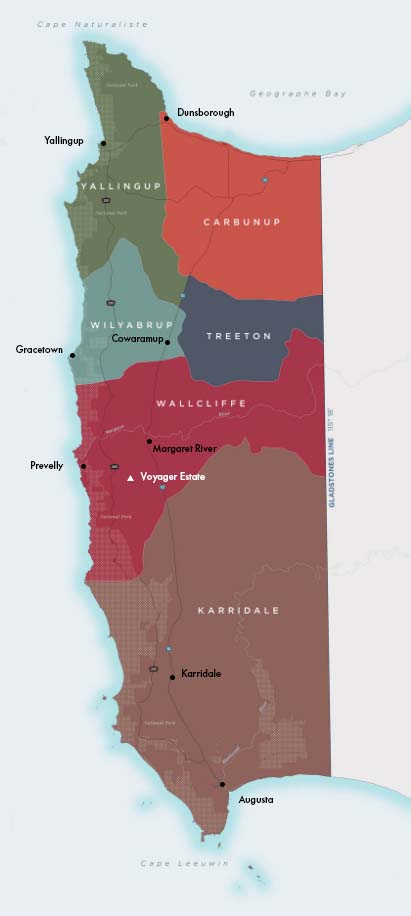
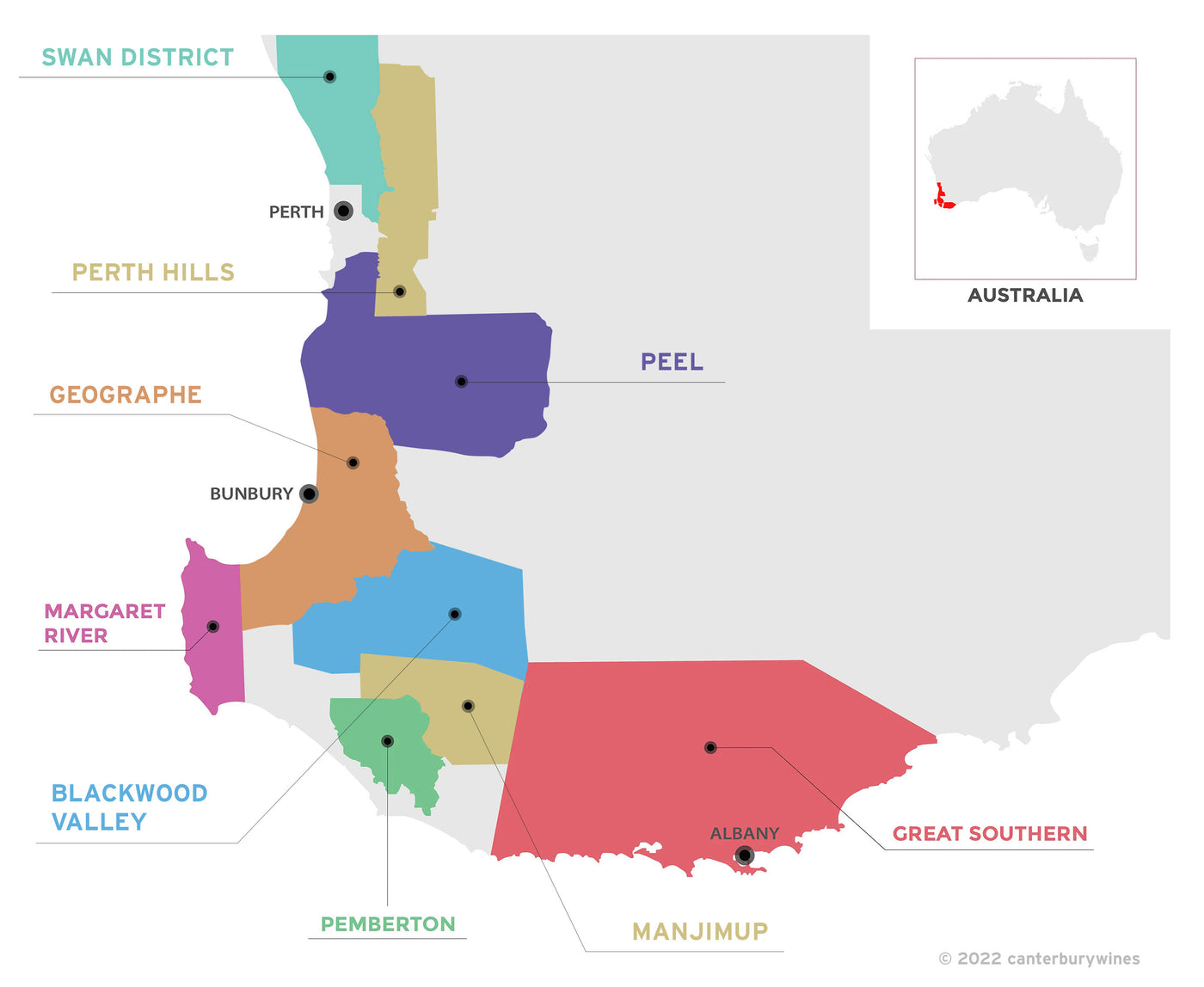
Western Australia
Western Australia is home to more than 400 wineries across nine vast and extraordinary wine regions which are almost entirely concentrated in the south-west and great southern land divisions of the State. The regions are Blackwood Valley, Geographe, Great Southern, Peel, Pemberton, Manjimup, Margaret River and Swan District.
The oldest region is the Swan Valley, the best known both nationally and internationally is Margaret River and the largest is Great Southern. The Great Southern region is further divided into the five subregions of Albany, Denmark, Frankland River, Mount Barker and Porongurup.
The history of wine production in Western Australia dates back to 1840 with the establishment of Sandalford in the Swan Valley region. The recognition of the fine wine possibilities started to be realised after the establishment of the Margaret River Region in 1967, which has become renowned for its high quality Chardonnay and Cabernet Sauvignon. The other regions produce a diverse range of regionally distinct wines, from stunning Rieslings and evocative Shiraz, to a range of unique Cabernet Sauvignon blends.
